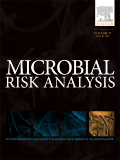
Microbial Risk Analysis
metrics 2024
Connecting Scholars to Combat Microbial Threats
Introduction
Microbial Risk Analysis, published by Elsevier, is a pivotal academic journal specializing in the intersection of epidemiology, infectious diseases, and medical microbiology. With an ISSN of 2352-3522 and an E-ISSN of 2352-3530, this journal has been contributing to the field since its inception in 2016 and continues to invite groundbreaking research as it converges through 2024. With a respectable impact factor, Microbial Risk Analysis holds a Q3 designation in key categories, showcasing its credibility with ranks such as #48 in Epidemiology and #124 in Infectious Diseases according to Scopus. The journal serves as an essential platform for researchers, professionals, and students alike, aiming to enhance understanding of microbial risks and their public health implications. Although it operates under a subscription model, its contents remain accessible to a broad range of interdisciplinary scholars dedicated to advancing microbial research. For those at the forefront of epidemiological and infectious disease studies, Microbial Risk Analysis represents a crucial resource for disseminating knowledge and fostering collaboration.
Metrics 2024
 0.55
0.55 3.00
3.00 2.70
2.70 21
21Metrics History
Rank 2024
Scopus
IF (Web Of Science)
JCI (Web Of Science)
Quartile History
Similar Journals

JOURNAL OF MICROBIOLOGY
Connecting global minds in the realm of microbiology.JOURNAL OF MICROBIOLOGY, published by the Microbiological Society Korea, is a prestigious peer-reviewed journal dedicated to the advancement of knowledge in the fields of microbiology, applied microbiology, and biotechnology. Established in 1996, this journal serves as a vital platform for researchers and professionals from around the globe to disseminate their findings and engage in multidisciplinary discussions pertaining to microbial sciences. With an H-index that reflects its impact, the journal holds a commendable Q2 ranking in key categories including Applied Microbiology and Biotechnology, as well as Medicine (Miscellaneous), which underscores its significance in the academic community. Despite being a subscription-based journal, the JOURNAL OF MICROBIOLOGY aims to contribute to the understanding of microbial processes and their applications, facilitating advancements that are essential in health, industry, and environmental sciences. Researchers, students, and practitioners are encouraged to explore this rich resource for the latest research and trends in microbiology.

Journal of Global Infectious Diseases
Exploring the complexities of infectious diseases worldwide.Journal of Global Infectious Diseases, published by Wolters Kluwer Medknow Publications, serves as a pivotal resource in the field of infectious diseases, offering insightful research and critical analyses that contribute to global health discourse. Since its inception as an Open Access journal in 2009, it has aimed to disseminate knowledge on various facets of infectious diseases, fostering collaboration among researchers, clinicians, and public health professionals. With an impact factor indicative of its growing significance—ranked in the Q3 category of Infectious Diseases for 2023—this journal publishes a diverse range of studies, from basic science to clinical applications. Its dedicated contributions help address pressing health challenges and enhance knowledge sharing in an era where infectious diseases pose significant threats worldwide. Based in India, the journal not only highlights regional health issues but also connects to the broader global landscape, making it an essential platform for anyone interested in advancing the field.
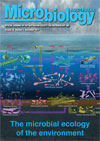
Microbiology Australia
Exploring the Frontiers of Microbial ScienceMicrobiology Australia is a prominent journal published by CSIRO PUBLISHING, focusing on the diverse and rapidly evolving field of microbiology. Since its transition to Open Access in 2021, it has broadened its accessibility, fostering greater dissemination of research findings among scholars and practitioners. The journal features a range of topics that are pivotal for understanding microbial systems in applied microbiology, medical microbiology, public health, and environmental applications. Despite its current categorization in the Q4 quartile across several categories, it remains an essential platform for emerging research and innovative methodologies. Researchers and professionals can benefit from the journal's commitment to enriching the global discourse on microbiological advancements. With its ISSN 1324-4272 and E-ISSN 2201-9189, Microbiology Australia caters to a wide audience in Australia and beyond, making significant strides in bridging the gap between research and practical applications in microbiology.
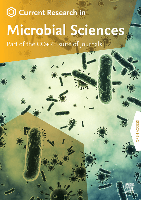
Current Research in Microbial Sciences
Empowering Scientific Collaboration in Microbial ResearchCurrent Research in Microbial Sciences is a distinguished peer-reviewed journal published by Elsevier, focusing on the dynamic and rapidly advancing fields of microbiology and infectious diseases. With an ISSN of 2666-5174, this journal has established itself as an essential resource for researchers, professionals, and students alike, offering the latest findings and insights from 2020 to 2024. The journal holds a significant position in the academic landscape, achieving a Q2 ranking across multiple categories, including Immunology and Microbiology, Infectious Diseases, and Medical Microbiology, demonstrating its impact in these critical areas of study. With impressive Scopus rankings—such as being placed in the 94th percentile for Immunology and Microbiology—current research is well-supported by a thriving scientific community. Although the journal is not open access, it serves as a vital platform for disseminating high-quality research and fostering collaboration within the microbial sciences. Engaging with this journal enables professionals and researchers to stay abreast of innovations and contribute to the collective body of knowledge that shapes our understanding of microbial interactions and infectious diseases.

mLife
Driving impactful discoveries in the diverse landscapes of microbiology.Welcome to mLife, an emerging journal at the forefront of microbiological research published by the esteemed WILEY in China. With its ISSN 2097-1699 and E-ISSN 2770-100X, mLife serves as a vital platform for scholars and practitioners aiming to advance their understanding of microbial sciences. With an impressive Q2 ranking in the Microbiology category and a Scopus rank of 143 out of 182, mLife is quickly establishing itself as a valuable source of cutting-edge research. The journal, covering a range of innovative topics from immunology to environmental microbiology, provides an engaging venue for disseminating high-quality research findings aimed at addressing real-world challenges. Authors and readers alike benefit from its accessibility features that encourage scholarly collaboration and information sharing. As we converge on the rich microbial landscapes from 2022 to 2024, mLife is committed to fostering a community dedicated to rigorous research and impactful discoveries.

Emerging Microbes & Infections
Transforming understanding of infectious challenges.Emerging Microbes & Infections is a premier open access journal, published by Taylor & Francis Ltd since 2012, dedicated to advancing the understanding of microbial infections and their implications in human health. With an impressive Q1 ranking across multiple categories—including Drug Discovery, Epidemiology, Immunology, and Infectious Diseases—this journal is at the forefront of research in the microbiological sciences. Covering a diverse range of topics, it serves as a vital resource for researchers, healthcare professionals, and students alike. The journal's commitment to open access ensures worldwide dissemination of cutting-edge findings, fostering collaboration and innovation in tackling challenges posed by emerging infections. As part of the thriving academic community in the United Kingdom, Emerging Microbes & Infections plays a crucial role in shaping the future of infectious disease research and public health.

BMC INFECTIOUS DISEASES
Transforming public health through rigorous research.BMC Infectious Diseases is a premier open-access journal published by BMC in the United Kingdom, dedicated to the field of infectious diseases. Established in 2001, this journal has been at the forefront of disseminating high-quality, peer-reviewed research, contributing significantly to the global understanding of infectious pathogens and their impact on public health. With a 2023 Scopus ranking of #100 out of 344 in the Medicine - Infectious Diseases category, and a notable Q1 quartile classification, it stands as a vital resource for researchers and professionals alike. Authors benefit from the journal's broad reach and visibility, ensuring their work is accessible to a wide audience. Access options are fully open, allowing for seamless dissemination of knowledge in the ongoing battle against infectious diseases. With an established history of publishing groundbreaking studies, BMC Infectious Diseases plays a crucial role in addressing critical issues and advancing research in the ever-evolving landscape of infectious diseases.
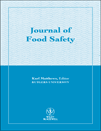
JOURNAL OF FOOD SAFETY
Uncovering vital knowledge in food microbiology.Journal of Food Safety is a premier resource in the field of food science, offering invaluable insights into food safety practices, microbiology, and parasitology. Published by WILEY, this journal has been a pivotal platform for the dissemination of research since its inception. With an impressive impact factor reflecting its esteemed reputation, the journal caters to a diverse audience of researchers, professionals, and students committed to advancing knowledge in food safety. While currently not an open access journal, it still provides essential findings that contribute significantly to the understanding of foodborne pathogens and preventive measures. Recognized in the Q2 and Q3 quartiles across various relevant disciplines, including Food Science, Microbiology, and Parasitology, the Journal of Food Safety continues to uphold high standards in scientific research and education. Researchers are encouraged to submit their manuscripts and engage with groundbreaking studies that are shaping the future of food safety.
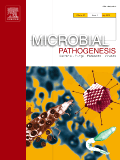
MICROBIAL PATHOGENESIS
Bridging Laboratory Discoveries with Clinical ImpactMICROBIAL PATHOGENESIS, published by Academic Press Ltd - Elsevier Science Ltd, is a prominent journal in the fields of Infectious Diseases and Microbiology, with a notable impact factor and classified in the Q2 quartile for both categories as of 2023. Since its inception in 1986, this journal has provided a platform for the dissemination of cutting-edge research that enhances our understanding of microbial infections and their implications in health and disease. The journal is indexed in Scopus, ranking #80 among 344 in Infectious Diseases and #57 among 182 in Microbiology, underscoring its significant contribution to the scientific community. Although it operates under a traditional subscription model, the content is vital for researchers, professionals, and students focused on the dynamics of microbial pathogenesis and the development of innovative therapeutic strategies. The journal's comprehensive scope aims to foster advancements in this critical area of study, bridging the gap between laboratory research and clinical applications.
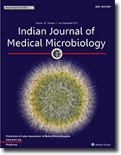
Indian Journal of Medical Microbiology
Advancing the Frontiers of Medical MicrobiologyIndian Journal of Medical Microbiology, published by Elsevier, is a pivotal peer-reviewed journal dedicated to the field of medical microbiology, providing a vital platform for research and scholarship since its inception in 1986. With an Open Access model established in 2001, it ensures the dissemination of scientific knowledge to a global audience, enhancing accessibility for researchers, professionals, and students alike. The journal's scope spans critical areas including immunology, infectious diseases, and microbiology, with an impressive trajectory marked by converged years of publication allowing for a comprehensive exploration of evolving scientific trends. As of 2023, the journal holds a Q3 ranking in Infectious Diseases and Microbiology (medical) and a Q4 ranking in Immunology and Microbiology categories, reflecting its significant yet growing impact in the field. Researchers seeking to contribute to or stay updated on the latest advancements in medical microbiology will find the Indian Journal of Medical Microbiology a valuable resource, as it consistently bridges the gap between emerging science and clinical application.